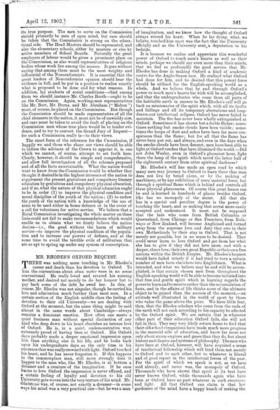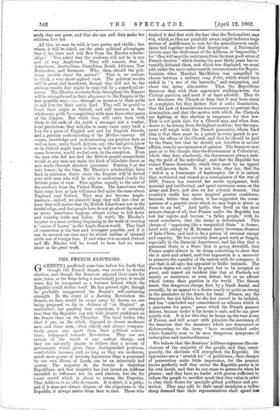MR. RHODES'S OXFORD BEQUEST.
TERE was nothing more touching in Mr. Rhodes's . career and death than his devotion to Oxford. To him the conventions about alma nutter were in no sense conventional. He really loved and revered his nursing mother, and desired not merely to do her honour but to pay back some of the debt he owed her. In this, of course, Mr. Rhodes was not singular, though he carried his love and admiration much further than most men. In a certain section of the English middle class the feeling of devotion to their old University—we are dealing with Oxford at the moment, but the same thing might be said almost in the same words about Cambridge—always remains a dominant emotion. How often one meets a quiet business man without special distinction of any kind who deep down in his heart cherishes an intense love of Oxford. He is, in a quiet, undemonstrative way, extremely proud of having been at Oxford. His Oxford days probably made a deeper emotional impression upon him than anything else in his life, and he looks back upon his undergraduate days as the only time in his existence that was reallycrowned with light. Oxford touched his heart, and he has never forgotten it. , If this happens to the commonplace man, still more strongly does it bauen to the man who, like Mi. Rhodes, is at bottom a dreamer and a creature of the imagination. If he once learns to love Oxford the impression is never effaced, and a certain feeling of loyalty and devotion to' his old University gets woven into the very texture of his mind. Mr. Gladstone was, of course, not exactly a dreamer—in some ways his mind was a very practical one—but he was a man of imagination, and we know how the thought of Oxford always stirred his heart. When he lay dying, what, we believe, touched him most was the fact that the University officially and as the University sent, a deputation to his bedside.
It is because we realise and appreciate this wonderful power of Oxford to touch men's hearts as well as their minds, perhaps we should say even more than their minds, that we feel so profoundly the good. service that Mr. Rhodes has done in making Oxford a kind of academic centre for the Anglo-Saxon race. He realised what Oxford had done for him, and he desired that this potent force should be utilised for the English-speaking world as a whole. And we believe that' by and through Oxford's power to touch men's hearts his wish will be accomplished, and that the undergraduates who come from all parts of the habitable earth in answer to Mr. Rhodes's call will go back as missionaries of the spirit which, with all its faults and failings and all its temporary aberrations and long- drawn-out intellectual eclipses, Oxford has never failed to maintain. The fire has never been wholly extinguished at Oxford. Sometimes it has shown but a feeble flicker; some- times nothing but smoke clouds have been visible ; some- times the heaps of dust and ashes have been far more con- spicuous than the flame ; but for all that the flame has' never been put out, and always, and even in the days when the smoke-clouds have been densest, men have been able to light at Oxford torches that have illumined the world.—Did not John Wesley, even in Oxford's gloomiest hour, light there the lamp of the spirit which saved the latter half of the eighteenth century from utter spiritual darkness?
Mr. Rhodes's will has made an open road by which many men may journey to Oxford to learn there that man- does not live by bread alone, or by the making of machinery, or by any exhibition of mere material force, but through a spiritual flame which is behind and controls all these physical phenomena. Of course this great lesson can• be and is learned in hundreds of places besides Oxford. She has no monopoly of the secret. All that she has in a special and peculiar degree is the power of touching the heart, and so making that secret more easily accepted and understood. It must not be supposed that the lads who come from British Columbia or Queensland, from Chicago or San Francisco, from Bula- wayo or New Zealand, will become Anglicised and turned away from the supreme love and duty they owe to their, own Motherlands by their stay in Oxford. That is not merely not possible, but in no sense to be desired. They could never learn to love Oxford and get from her what she has to give if they did not love more, and with a deeper, closer love, their own great Republic or their ow n free nations within the British Empire. Mr. Rhodes's bequest would have failed utterly if it had tried to turn a certain number of men born elsewhere into Englishmen. What is intended, and what we believe may be and will be accom- plished, is that certain chosen men from throughout the English-speaking world will be able to become initiated into that free and gentle spirit which in learning regards the power to learn and to receive rather than the accumulation of facts, and in the affairs of life thinks more of the ultimate object to be gained than the success of the moment,—an attitude well illustrated in the world of sport by those who value the game above the prize. We have little fear, then, that the Rhodes scholars who come from the ends of the earth will not each according to his capacity be affected by the Oxford spirit. We are certain that in whatever other part of their education Oxford fails, she will not fail in that. They may very likely return home to find that their old school companions have made much more progress in the material side of education, and know far more not only about steam-engines and gases than they do, but about history and classics and systems of philosophy. The men who have been at Oxford, however, will have acquired a sense of intellectual fellowship which will bind them not merely to Oxford and to each other, but to whatever is liberal and of good report in the intellectual forces of the past. For the spirit of which we speak is not, as we have said already, and never was, the monopoly of Oxford. Thousands who have shown that spirit at its best have never known Oxford, while thousands again who have been at Oxford have no part whatever in such sweetness and light. All that Oxford can claim is that her gardeners of the mind have a happy knack of making the seeds they sow grow, and that she can and does make her children love her.
All this, we may be told, is very pretty and idyllic ; but where, it will be asked, are the great political advantages that it has been said will flow from the Rhodes scholar- ships ? You admit that the students will not be in any sort of way Anglicised. They will remain; that is, Americans, Australians, Canadians, South Africans, New Zealanders, and Germans. Why, then, should the poli- tician trouble about the matter ? ' That is, we venture to think, a very short-sighted view. The political results will be great and beneficent, though they will not be the obvious results that might be expected by a superficial ob- server. The Rhodes students from throughout the Empire will be strengthened in their alleg,iance to the Empire in the best possible way,—i.e., through an increase in their pride in and love for their native land. They will be proud to boast their origin in Oxford, and will increase in that wholesome pride by competition with men from other parts of the Empire. But while they will carry back with them to the ends of the earth a stronger, not a weaker, local patriotism, they will also in many cases carry back a love for a piece of English soil and for English friends, and a genuine understanding of the Mother-country. Of course, knowledge and understanding can produce hate as well as love ; and a South African, say, who had got to know us in Oxford might learn to hate as well as to love. These cases, however, would, we feel sure, be the exception. Even the men who did not find the British people sympathetic would at any rate not make the kind of blunders about us now made through absolute ignorance. Putting it at the very lowest, by the time Mr. Rhodes's scholarships have been in existence thirty years the Empire will be dotted over with men who will be able to understand clearly the British point of view. This applies equally to the case of the students from the United States. The Americans who have come here as lads will never feel quite the same about England and Oxford. They may not become Anglo- maniacs—indeed, we sincerely hope they will not—but at least they will realise that the British Islands are not in the feudal stage, and that people here do not go about the world, as many Americans suppose, always trying to fall down and worship lords and ladies. In truth, Mr. Rhodes's bequest is a most striking beginning in the work of creating a " union of hearts " in the Anglo-Saxon world. That kind of connection is the best and strongest possible, and if it can be secured our race may be afraid neither of internal strife nor of foreign foes. If and when it is secured, Oxford and Mr. Rhodes will be found to have had no mean share in the great work.











































 Previous page
Previous page